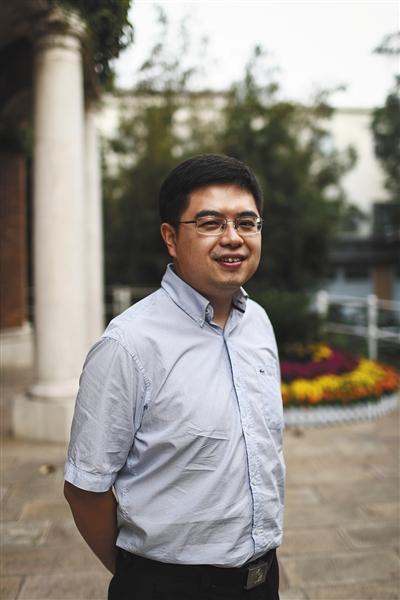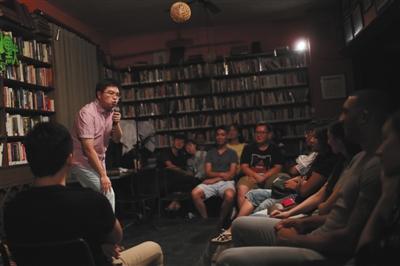

Fourteen years is long enough to turn a young and unconventional Chinese rapper into a civil servant who works from 9 to 5.
Hao Yu, a 36-year-old who works at a state organ, has finished such a transition, switching his oversized hip-hop outfits for a suit and tie.
The middle-aged man, who is living an ordinary life in Beijing just like his peers do, was once a rapper whose songs have been played by millions of people more than a decade ago.

(Photo taken on Sept. 24 shows the rapper Hao Yu)
Compared to the promising young MCs who made their names in a popular hip-hop contest in China in this summer, Hao, who takes the bus at rush hours to office every day, is having a completely different life experience.
Hao became a hip-hop enthusiast in middle school. After entering Harbin Engineering University, he started rapping. His songs were mostly sarcastic and self-mocking, telling the stories that happened in his college life.
His dormitory was his record studio. With a computer, a sound card, and a cheap microphone, he began mixing tracks with a digital audio workstation he downloaded from the Internet.
He released about 20 songs for his schoolmates, and soon became a rap star on the campus. One of his songs was played 1.2 million times in four months, and it was hailed as the most popular Internet artwork of the time.
Entertainment back then was less developed, and ideas could be easily spread, Hao explained, attributing the popularity of the song to the specific cultural environment of those days.
However, Hao differentiated himself from normal Internet artists, saying he has always wanted to promote renaissance of the culture rather than to entertain the public.
Hao earned himself a chance to sign a deal with a record label in 2003, and he planned to give up his academic path. However, his decision was strongly opposed by his parents, who thought making records was a risky, improper occupation.
His father, a senior staff member at a state-owned factory, had always wanted him to be engaged in technical work. His parents even found him a psychologist to help talk him out of the decision.
“I started to realize that I was not the one in control of my own fate, and it would be hard to succeed even if I worked hard,” Hao exhaled. His ambition to be a renaissance promoter was breaking down at that moment.
Later, he finally bowed to reality and made his decision – to apply for post graduate study. Since then, he accepted the fact that he would not become a rapper but an ordinary person who leads an ordinary life.
Hao compares himself to liquid, that is, shapeless, but always able to adapt to the environment. The important thing is that he always keeps it real.
After getting a master’s degree, Hao worked at the China Federation of Literary and Art Circles (CFLAC). Serving the artists there is a major part of his work.
The first few years of his career were the hardest for him, as that is when he found that rap was unable to express his understanding of the world. He had lost his inspiration for music the moment he stepped out of campus.

(Photo taken on Sept. 16 shows Haoyu in a rap show in Beijing)
When he saw the machine-made performances of the artists he served, he doubted whether this is what life was supposed to be like.
Hao became a father in 2014. Last year, he planned to buy a house in a good school district, for which he had to sell his current estate and apply for another two million yuan (over $300,000) mortgage. The huge gap between his salary and the high monthly payment once again made him surrender to the real world.
Gradually, he learned to keep his sorrows inside, and he does not even mention them to his wife. However, he is still a happy and outgoing man at the workplace who brings laughter to his colleagues.
He has been a civil servant for 10 years, a fact that astonishes all of his friends. They cannot imagine that a once desiring rapper has now settled down for such a long time.
“I was full of hope when I was young, feeling that I could change the world by rapping,” Hao said. But he later realized the complication of the world. Every change is made over time, not overnight, he said.
Coming into the 36th year of his life, Hao is tagged with materialism and a feeling of helplessness. But at the same time, he has acquired a better understanding of contentment, fear, gratefulness, and forgiveness.
This year, he grabbed his microphone again, as a talk show host at a night club in Beijing. He takes it as a way to fight against his middle-age crisis: to let out the ego that he hides in the day. It is also a way for him to earn extra money for his son.
 Fire brigade in Shanghai holds group wedding
Fire brigade in Shanghai holds group wedding Tourists enjoy ice sculptures in Datan Town, north China
Tourists enjoy ice sculptures in Datan Town, north China Sunset scenery of Dayan Pagoda in Xi'an
Sunset scenery of Dayan Pagoda in Xi'an Tourists have fun at scenic spot in Nanlong Town, NW China
Tourists have fun at scenic spot in Nanlong Town, NW China Harbin attracts tourists by making best use of ice in winter
Harbin attracts tourists by making best use of ice in winter In pics: FIS Alpine Ski Women's World Cup Slalom
In pics: FIS Alpine Ski Women's World Cup Slalom Black-necked cranes rest at reservoir in Lhunzhub County, Lhasa
Black-necked cranes rest at reservoir in Lhunzhub County, Lhasa China's FAST telescope will be available to foreign scientists in April
China's FAST telescope will be available to foreign scientists in April "She power" plays indispensable role in poverty alleviation
"She power" plays indispensable role in poverty alleviation Top 10 world news events of People's Daily in 2020
Top 10 world news events of People's Daily in 2020 Top 10 China news events of People's Daily in 2020
Top 10 China news events of People's Daily in 2020 Top 10 media buzzwords of 2020
Top 10 media buzzwords of 2020 Year-ender:10 major tourism stories of 2020
Year-ender:10 major tourism stories of 2020 No interference in Venezuelan issues
No interference in Venezuelan issues
 Biz prepares for trade spat
Biz prepares for trade spat
 Broadcasting Continent
Broadcasting Continent Australia wins Chinese CEOs as US loses
Australia wins Chinese CEOs as US loses